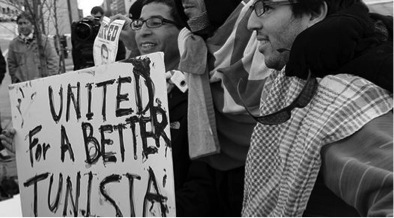
On their second day of voting for a new constitution, lawmakers in Tunisia rejected Islam as the primary source of law in their country. The National Constituent Assembly adopted the first two articles of the draft constitution on January 4, establishing Tunisia as a republic and Islam as its state religion but it rejected amendments that the Koran should serve as the primary source of law.
While the first article says, “Tunisia is a free, independent and sovereign state. Islam is its religion, Arabic is its language, and it is a republic. It is not possible to amend this article,” the second article adopted by the assembly will serve as a crucial democratic milestone for the country. It describes Tunisia as a “civil state based on citizenship, the will of the people and the rule of law.”
Both articles were a compromise between the Islamist Ennahda Party, which heads the current coalition government, and the secular opposition. The voting on January 4, took place amid concerns that the members of the parliament may not be able to meet their January 14 deadline for the adoption of a new charter since the legislature’s deliberations have been slow and often disrupted.
During the session, the title of the charter was approved and the first three paragraphs of the preamble were finalized. Another 146 articles and 30 amendments remain to be scrutinized.
On January 14, 2011, dictator Zine El Abidine Ben Ali was ousted, after which he, along with his family, fled the country for exile in Saudi Arabia. The National Constituent Assembly was elected in October 2011, and they were expected to draft and adopt a constitution within one year. However, the process was delayed due to differences between Ennahda and the opposition as well as violent social unrest.
After criticism from different quarters, Ennahda and the opposition have finally started negotiating intensely during the sessions so that they can secure approval from two thirds of the assembly’s 217 elected members. In the absence of such a majority, the constitution will fail to be adopted and it will have to be put to referendum. Prime Minister Ali Larayedh has said that he is prepared to step down as long as a new constitution is adopted, and electoral laws and an electoral commission are in place for elections to be held in 2015.
Photo Credits: Celebration of President's Ouster at Tunisian Embassy, 2011 by Collin David Anderson
